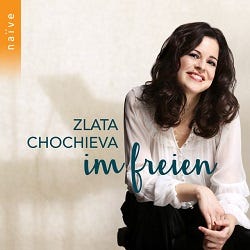Zlata Chochieva - Im Freien
(Naïve Records, 2023)
Russian pianist Zlata Chochieva began her recording career with tightly-focussed projects featuring the music of Rachmaninoff riffing on Chopin (Chopin Variations and Piano Sonata (Piano Classics, 2012)); Chopin (Études Complete (Piano Classics, 2014); and Rachmaninoff alone (Rachmaninoff: Etudes-tableaux (complete), Piano Classics, 2015)). The pianist left Piano Classics in 2021, recording (re)creations: Piano Transcriptions by Rachmaninoff, Liszt, and Friedman for Accenus Music.
Chochieva’s recording programs began to fragment in a compelling way with Chiaroscuro: Mozart & Scriabin (Naïve, 2022) on which she drew persuasive parallels between the Classical and Late Romantic periods regarding shadow, light, and darkness as extensions of one another in music. The pianist follows this up with Im Freien (Out of Doors) for Naïve Records. With Chiaroscuro as her springboard, Chochieva gives much thought to the theme and programming of Im Freien with regard to choosing composers and compositions to compare and contrast within the theme of nature and the outdoors.
For her subjects, Chochieva chooses two sets of Romantic and Late Romantic composers, spread over two CDs. The first disc is devoted to Robert Schumann’s Waldszenen and Maurice Ravel’s Miroirs both sets of piano miniatures, pitting Schumann’s Goethe-esque union of man and nature against Ravel’s impressionistic view of man fully integrated into the background of nature. Chochieva identifies and isolates Schumann’s simplicity, providing it with sharp relief tonally. The pianist points out in her notes that with Waldszenen there are so few notes that the performer cannot hide behind technical effects. Schumann requires honesty, particularly in his miniatures (the same can be heard in Isata Kannea-Mason’s recent recording of Schumann’s Kinderszenen (Childhood Tales (Decca Records, 2023)).
The Ravel permits Chochieva the freedom of impressionist thought. Schumann sounds guarded in his almost pedantic Romanticism where Ravel expresses a freedom to consider a certain whimsy in his pieces. Chochieva immediately realizes this and acts accordingly, juxtaposing the light and dark crescendo-diminuendo relationships of Ravel’s nature topics.
The second CD is another matter. Chochieva performs two of Liszt's Transcendental Études (No. 5, Feux follets and No. 12, Chasse-neige) where she does the consummate show-off, Liszt, proud performing the pieces as unbound notes disintegrating into beautifully ravenous particles nearing lightspeed. To cool the program, Chochieva next performs three movements from Petite histoire by German composer Felix Draeseke (still bringing the fire in No. 2 Intermezzo). Chochieva’s articulation is powerful and her left hand is impressive. She dispatches Adolf Schulz-Evler’s Arabeskes on "Die schönen blauen Donau," with a militant grace before spelunking into the Bartok’s cavernous Im Freien Sz81: No.4: “Klänge Der Nacht.”
Zlata Chochieva proves she has both the brains to envision a provocative piano program and the chops to bring the chosen music to near criticality. Her Liszt is as sparkling as her Schumann is brooding and brilliant.



